
Mitarbeitende
Aktuelle Mitarbeitende
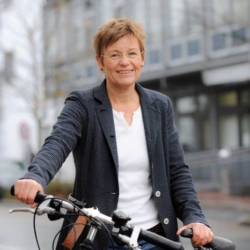
Prof. Dr. rer. nat.
Susanne Moebus, MPH
Biologin & Epidemiologin
Leiterin des Instituts für Urban Public Health (InUPH)
Prof. Dr. rer. nat.
Susanne Moebus, MPH
- Seit 2017:
- Vertretung UDE im Koordinierungskreis Kompetenzfeld „Metropolenforschung“ (KoMet)
- Seit 2016:
- Sprecherin des Profilschwerpunkts Urban Systems, UDE
- Vertreterin der UDE im Koordinierungskreis der Universitätsallianz Ruhr Kompetenzfeld Metropolenforschung (KoMet) sowie Leiterin Forschungsfeld „StadtGesundheit“ in KoMet
- Seit 2014:
- Mitglied im Use & Access‐Komitee der Nationalen Gesundheitsstudie (NaKo)
- 2008:
- Zertifikat „Epidemiologie“ DGEpi, GMDS, DGSMP und DR‐IBS
- Habilitation, Medizinische Fakultät Essen, Universität Duisburg-Essen
- 1997:
- Master of Public Health (MPH), Fakultät für Gesundheitswissenschaften, Universität Bielefeld
- 1994:
- Promotion, Dr. rer. nat., Institut für Zellbiologie, Biochemie und Biotechnologie, Universität Bremen
- 1988:
- Diplom Biologie, Institut für Zellbiologie, Biochemie und Biotechnologie, Universität Bremen
- Heinz Nixdorf Recall MehrGenerationenStudie (seit 2013, Einschluss der Kinder und PartnerInnen der HNR-StudienteilnehmerInnen)
- Heinz Nixdorf Recall Studie (seit 2000, 4.814 Männer und Frauen aus Metropole Ruhrgebiet, 10-Jahres-Follow up beendet in 2014)
- In beide Studien eingebettet: die 1000GehirneStudie in Kooperation mit dem Forschungszentrum Jülich (www.fz-juelich.de/inm/inm-1/DE/Forschung/1000_Gehirne_Studie/1000_Gehirne_Studie_node.html)
- „Auswirkungen der Energie- und Ressourcenpolitik auf die Gesundheit“. Gutachtens für eine Synopse zu wissenschaftlichen Studien und Veröffentlichungen zum Thema im Auftrag vom Bundesumweltamt (UBA)
- Co-PI Studienzentrum Essen „Nationalen Kohorte“,
- Konzept- und Designerstellung für das Bundesumweltamt (UBA) für eine umweltepidemiologische Geburtskohorte (n=200.000)
- Konzeption, Leitung und Durchführung der bundesweit durchgeführten Prävalenzstudie GEMCAS (German Metabolic and Cardiovascular Risk Project), Einschluss von 36.000 Patienten der hausärztlichen Versorgung
- Aufbau und Implementierung eines Qualitätsmanagements für die Klinik für Naturheilkunde und Integrative Medizin, Knappschafts-Krankenhaus, Kliniken Essen-Mitte.
- BMBF-Projekt Gesundheitsökonomische Evaluation im Rahmen der Heinz Nixdorf Recall Studie
- Gütersloher Studie zu Allergien und Atemwegserkrankungen bei Kindern. Umwelt-epidemiologische Querschnittstudie in Kooperation mit dem Umweltamt Gütersloh
- Safe-Life-Studie (Stress and Factors of Lifestyle in Coronary Patients: Evaluation of Lifestyle Interventions on endothelial/autonomic Function, EBCT and Quality of Life), Kooperationsprojekt Klinik für Naturheilkunde und Integrative Medizin
- Evaluation des Konzeptes „Die Rauchersprechstunde – Beratungskonzept für Gesundheitsberufe“ des Deutschen Krebsforschungszentrums (DKFZ)
- Erhebung der Patientenzufriedenheit am Universitätsklinikum Essen
- Gutachten zur Analyse und Bewertung der Ursachen für die unterdurchschnittliche Inanspruchnahme der Versorgungseinrichtungen für Herz-Kreislauferkrankungen in NRW durch Frauen. Im Auftrag der Enquete-Kommission „Zukunft einer frauengerechten Gesundheitsversorgung in NRW“
- Randomisierte, klinische Studie zur Evaluation der Nachhaltigkeit von Vini-Yoga in der stationären Rehabilitation von Patienten mit arterieller Hypertonie. Kooperationsprojekt mit LVA-Reha-Klinik Roderbirken (LVA Rheinprovinz)
- Projekt zur Identifizierung von Programmen zur Gesundheitsförderung übergewichtiger und adipöser Kinder aus sozial benachteiligten Verhältnissen für den Bundesverband der Betriebskrankenkassen (BKK BV)
- Beratungstätigkeiten für Team Gesundheit GmbH/Institut für Prävention und Gesundheits-förderung (Träger BKK BV), Essen
- Gesundheitsmonitor 2006 der Bertelsmann Stiftung: Alternativmedizin sowie Naturheilverfahren in Bewusstsein und Praxis von niedergelassenen Ärzten
- Evaluation eines Modellvorhabens nach §§63ff SGB V zu Naturheilverfahren von Betriebskrankenkassen (BKK) im Rhein-Ruhrgebiet. Versorgungsepidemiologische, prospektive Langzeitstudie

Dr. rer. nat.
Dennis Schmiege
Wissenschaftlicher Mitarbeiter
Dr. rer. nat.
Dennis Schmiege
- 2022:
- Promotion, Dr. rer.nat., Geographisches Institut, Rheinische Friedrich-Wilhelms-Universität Bonn
- 2020:
- Wissenschaftlicher Mitarbeiter beim Institut für Urban Public Health (ehemals Centre for urban Epidemiology), Deutschland
- 2017 – 2020:
- Wissenschaftlicher Mitarbeiter am Zentrum für Entwicklungsforschung und Doktorand am Geographischen Institut der Universität Bonn und am Institut für Hygiene und Öffentliche Gesundheit, Universitätsklinikum Bonn, Deutschland
- 2017:
- M.Sc. „Geography of Environmental Risks and Human Security”, United Nations University – Institute for Environment and Human Security & Rheinische Friedrich-Wilhelms-Universität Bonn, Deutschland
- 2015:
- B.Sc. Geographie, Rheinische Friedrich-Wilhelms-Universität Bonn, Deutschland
12. Humboldtsteiner Tage: Jahrestagung des Arbeitskreises Medizinische Geographie und Geographische Gesundheitsforschung und der AG Räumliche Statistik, 2022:
Kleinräumige Unterschiede von SARS-CoV-2 RNA im urbanen Abwasser in Essen. Web: https://med-geo.de/index.php/jahrestagung-2022/
19th International Medical Geography Symposium (IMGS), 2022:
Socio-spatial variation of antibiotic use and antibiotic-resistant bacteria in a sewershed in the Ruhr Metropolis, Germany. Web: https://imgs2022.org/conference-abstracts/
14th European Public Health Conference, 2021:
Antibiotic resistance in wastewater from socio-spatially different communities. Web: https://ephconference.eu/
One World – One Health. Antibiotika-Resistenzen als globales Gesundheitsproblem. Fachtagung zum 40. Jubiläum der BUKO Pharma-Kampagne, 2021:
Multiresistente Bakterien im Abwassersystem einer Stadt in der Ruhr Metropole. Web: https://bukopharma.de/konferenz/part2.html
6th World One Health Congress, 2020:
What drives antibiotic use in the community? A systematic review of determinants in the human outpatient sector
COVID-19 als Zäsur? Geographische Perspektiven auf Räume, Gesellschaften und Technologien in der Pandemie, 2020:
One Health im Kontext von Coronavirus-Ausbrüchen –die zentrale Rolle der Geographie. Web: https://www.transient-spaces.org/online-symposium-covid-19-als-zasur/
5th International Symposium on the Environmental Dimension of Antibiotic Resistance, 2019, Hong Kong:
Risk assessment of intra-urban dissemination of multidrug-resistant bacteria in the Ruhr Metropolis (Germany). Web: https://www.antibiotic-resistance.de/
20th International Symposium on Health-Related Water Microbiology 2019, Wien, Österreich:
Risk assessment of intra-urban dissemination of multidrug-resistant bacteria in the Ruhr Metropolis (Germany). Web: http://www.hrwm.eu/
Deutscher Kongress für Geographie, 2019:
Intra-urbane Verteilung von multiresistenten Bakterien in sozialräumlich gegensätzlichen Stadtbezirken der Stadt Dortmund, Ruhr Metropole. Web: https://dkg2019.geographie.uni-kiel.de/index.html
Talleb Y, Heinzelmann F, Haselhoff T, Schmidt T, Nafo I, Moebus S, Ickstadt K, Schmiege D. Socio-spatial characterization of sub-sewersheds for wastewater-based epidemiology (WBE): Developing and evaluating two estimators for population-related variables. Spatial and Spatio-temporal Epidemiology, 100759. https://doi.org/10.1016/j.sste.2025.100759
Klassen O, Moebus S, Schmiege D. Wastewater analysis of chemical markers of public health concern at small spatial scales: A scoping review. PLOS Global Public Health, 5(9), e0005058. https://doi.org/10.1371/journal.pgph.0005058
Schmiege D, Salemi A, Högel C, Bettinger S, Schmidt TC, Moebus S. Impact of physicochemical parameters on nicotine metabolites and Bisphenol A in municipal wastewater: A pilot study in a German metropolitan area. Science of The Total Environment. 2025;967:178767. https://doi.org/10.1016/j.scitotenv.2025.178767
Schröder J, Moebus S, Schmiege D. Gesundheit in und durch Smart Cities. IzR Informationen zur Raumentwicklung – Ein Kosmos neuer Stadtwelten? 2024; 51(1):[82-93 pp.]. https://biblioscout.net/article/99.140005/izr202401008201
Weber F-A, Schoth J, Jagemann P, Schmidt T, Widera M, Wilhelm A, Meyer F, Schmithausen R, Kraiselburd I, Moebus S, Schmiege D, Wintgens T, Linnemann V, Wolber J-L. WBEready–Wastewater-based epidemiology and preparedness: research needs for an adaptive monitoring in the Public Health Service. Das Gesundheitswesen. 2024;86(S 02). https://www.thieme-connect.com/products/ejournals/abstract/10.1055/s-0044-1781837
Anthonj C, Stanglow SN, Leinen A, Flacke J, Manga M, Schmiege D, Grunwald N. “A question of human dignity”. Identifying solutions to improve WASH for people experiencing homelessness. A case study from Germany. Water Security. 2024;22:100176. https://doi.org/10.1016/j.wasec.2024.100176
Schmiege D, Haselhoff T, Thomas A, Kraiselburd I, Meyer F, Moebus S. Small-scale wastewater-based epidemiology (WBE) for infectious diseases and antibiotic resistance: A scoping review. International Journal of Hygiene and Environmental Health. 2024;259:114379. https://doi.org/10.1016/j.ijheh.2024.114379
Schmiege D, Kraiselburd I, Haselhoff T, Thomas A, Gosch J, Doerr A, Schoth J, Teichgräber B, Moebus S, Meyer F. Analyzing community wastewater in sub-sewersheds for the small-scale detection of SARS-CoV-2 variants in a German metropolitan area. Science of the Total Environment, 898, 165458. 2023. https://doi.org/10.1016/j.scitotenv.2023.165458
Schmiege D, Haselhoff T, Ahmed S, Anastasiou OE, Moebus S. Associations Between Built Environment Factors and SARS-CoV-2 Infections at the Neighbourhood Level in a Metropolitan Area in Germany. Journal of Urban Health. 2023. https://doi.org/10.1007/s11524-022-00708-5
World Health Organization. Regional Office for Europe (Schmiege D., Shinee E., Grossi V., Schmoll O.) Drinking-water, sanitation and hygiene in the WHO European Region: highlights and progress towards achieving Sustainable Development Goal 6. Copenhagen: WHO Regional Office for Europe; 2022. https://apps.who.int/iris/handle/10665/360428
Falkenberg T, Paris JMG, Patel K, Arredondo AMP, Schmiege D, Yasobant S. Operationalizing the One Health Approach in a Context of Urban Transformations. In: Gatzweiler FW, editor. Urban Health and Wellbeing Programme: Policy Briefs: Volume 3. Singapore: Springer Nature Singapore; 2022. p. 95-102. https://doi.org/10.1007/978-981-19-2523-8_14
World Health Organization. Regional Office for Europe (Uprety S., Schmoll O., Lüthi C., Marks S., Howard G., Nikiforova N., Paderi V., Schmiege D., Shinee E.) Delivering safe sanitation for all: areas for action to improve the situation in the pan-European region. Copenhagen: WHO Regional Office for Europe; 2022. Licence: CC BY-NC-SA 3.0 IGO. https://apps.who.int/iris/handle/10665/363512
Schmiege D, Falkenberg T, Moebus S, Kistemann T, Evers M. Associations between socio-spatially different urban areas and knowledge, attitudes, practices and antibiotic use: A cross-sectional study in the Ruhr Metropolis, Germany. PloS one. 2022;17(3):e0265204. https://doi.org/10.1371/journal.pone.0265204
Falkenberg T, Schmiege D, Zacharias N. Spatial dimensions of One Health – the example of Antibiotic Resistance. In: Kistemann & Schweikart (Hrgs.): Sonderband der Schriftenreihe GGF (Geographische Gesundheitsforschung) des Vereins zur Förderung der Geographischen Gesundheitsforschung 2022. https://vggf.de/wp/index.php/schriftenreihe/
Schmiege D, Zacharias N, Sib E, Falkenberg T, Moebus S, Evers M, Kistemann T. Antibiotic resistance in wastewater from socio-spatially different communities. European Journal of Public Health. 2021;31(Supplement_3). https://doi.org/10.1093/eurpub/ckab165.627
Schmiege D, Zacharias N, Sib E, Falkenberg T, Moebus S, Evers M, Kistemann T. Prevalence of multidrug-resistant and extended-spectrum beta-lactamase-producing Escherichia coli in urban community wastewater. Science of The Total Environment. 2021;785:147269. https://doi.org/10.1016/j.scitotenv.2021.147269
Brückner A, Paris JMG, Schmiege D, Swoboda P. Urban transformation and the need for One Health. Recommendations for Ruhr Metropolis. 2020. https://www.zef.de/project-homepages/one-health/template-following/policy-briefs.html
Schmiege D. Don’t waste water: wastewater surveillance, antimicrobial resistance and One Health.; 2020. https://www.ukbonn.de/site/assets/files/16451/water_and_risk_vol30_low.pdf
Schmiege D, Evers M, Kistemann T, Falkenberg T. What drives antibiotic use in the community? A systematic review of determinants in the human outpatient sector. International Journal of Hygiene and Environmental Health. 2020;226:113497. https://doi.org/10.1016/j.ijheh.2020.113497
Schmiege D, Evers M, Zügner V, Rickert B. Comparing the German enabling environment for nationwide Water Safety Plan implementation with international experiences: Are we still thinking big or already scaling up? International Journal of Hygiene and Environmental Health. 2020;228:113553. https://doi.org/10.1016/j.ijheh.2020.113553
Schmiege D, Perez Arredondo AM, Ntajal J, Minetto Gellert Paris J, Savi MK, Patel K, Yasobant S, Falkenberg T. One Health in the context of coronavirus outbreaks: A systematic literature review. One Health. 2020;10:100170. https://doi.org/10.1016/j.onehlt.2020.100170
Schmiege D, Schmoll O, Demilecamps C. Inequalities in access to basic drinkingwater and sanitation services. Environmental health inequalities in Europe Second assessment report. Copenhagen: WHO Regional Office for Europe; 2019. https://www.who.int/europe/publications/i/item/9789289054157
Zügner V, Rickert B, Schmiege D. Erfahrungen von Wasserversorgungen mit Risikomanagement in Deutschland. energie | wasser-praxis. Ausgabe 08/19.2019. https://www.energie-wasser-praxis.de/heftarchiv/2019/8/
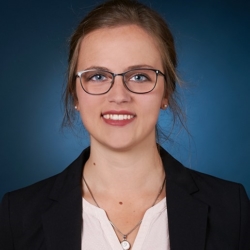
Dr. rer. medic.
Judith Schröder
Wissenschaftliche Mitarbeiterin
Dr. rer. medic.
Judith Schröder
- 2020:
- Wissenschaftliche Mitarbeiterin und Doktorandin am Institut für Urban Public Health (ehemals Centre for urban Epidemiology), Deutschland
- 2018 – 2020:
- Wissenschaftliche Mitarbeiterin am Wuppertal Institut für Klima, Umwelt, Energie gGmbH, Abteilung Energie-, Verkehrs- und Klimapolitik, Deutschland
- 2015 – 2018:
- Wissenschaftliche Hilfskraft am Wuppertal Institut für Klima, Umwelt, Energie gGmbH, Abteilung Energie-, Verkehrs- und Klimapolitik, Deutschland
- 2017:
- M.A. Europäistik/European Studies an der Bergischen Universität Wuppertal, Deutschland
- 2013:
- Kombinatorischer B.A. Politikwissenschaft und Philosophie an der Bergischen Universität Wuppertal, Deutschland
Schröder J, Moebus S. Gesundheitsförderung als transformative Kraft sozial-ökologischer (Stadt-)Entwicklung. In: Stadt und Gesundheit 2040. Danckert J, Baumgarten M, (Eds.). MWV Medizinisch Wissenschaftliche Verlagsgesellschaft; 2025. p. 13-8. https://www.mwv-berlin.de/produkte/!/title/stadt-und-gesundheit-2040/id/1077
Haselhoff T, SCHRöER K, SCHRöDER J, Moebus S. Associations between acoustic indices and the evaluation of the urban soundscape according to ISO 12913. INTER-NOISE and NOISE-CON Congress and Conference Proceedings: Institute of Noise Control Engineering; 2024. p. 8209-14. https://doi.org/10.3397/IN_2024_4059
Schröder J, Moebus S. Die Rolle öffentlicher Gesundheit im Umgang mit dem Klimawandel. Eine gesellschaftstheoretische Einordnung. Gesundheit – Gemeinsam Kooperationstagung der GMDS, DGSMP, DGEpi, DGMS und DGPH; 2024; Dresden: German Medical Science GMS Publishing House. https://dx.doi.org/10.3205/24gmds471
Schröer K, Haselhoff T, Schröder J, Moebus S. Zusammenhänge zwischen akustischen Indizes und der Bewertung der städtischen Geräuschumgebung basierend auf Soundwalks in Essen, Deutschland. Gesundheit – Gemeinsam Kooperationstagung der GMDS, DGSMP, DGEpi, DGMS und DGPH; 2024; Dresden: German Medical Science GMS Publishing House. https://dx.doi.org/10.3205/24gmds419
Schröder J, Moebus S, Schmiege D. Gesundheit in und durch Smart Cities. IzR Informationen zur Raumentwicklung – Ein Kosmos neuer Stadtwelten? 2024; 51(1):[82-93 pp.]. https://biblioscout.net/article/99.140005/izr202401008201
Hornberg J, Schröder J, Schroeer K, Hinse M, Moebus S. Erhebung der urbanen Geräuschkulisse im Rahmen von Hörspaziergängen. In: Canzler W, Haus J, Kellermann R, Schröder S, Thomsen C, editors. Gemeinsam in Bewegung: Forschung und Praxis für die Mobilitätswende Beispiele und Erkenntnisse aus den Projekten der BMBF-Fördermaßnahmen MobilitätsWerkStadt 2025 und MobilitätsZukunftsLabor 2050: BeNaMo Sammelband. Nexus Institut für Kooperationsmanagement und interdisziplinäre Forschung und Wissenschaftszentrum Berlin für Sozialforschung.; 2024. p. 249-57. https://www.zukunft-nachhaltige-mobilitaet.de/sammelband/
Hornberg J, Hemker F, Schröer K, Hinse M, Moebus S, Schröder J. Association between perceived sound type dominance and overall assessment of the acoustic environment using ISO 12913 soundwalks. The Journal of the Acoustical Society of America. 2024;156(4):2827-37. https://doi.org/10.1121/10.0032472
Moebus S, Schröder J. Gesundheitsfördernde Stadtlandschaften – Urban Public Health und Nachhaltigkeit im Kontext von Städtebau und Stadtplanung. In: Beier S, Hense P, Klümper C, Lechtenböhmer S, Reicher C, editors. Die UN-Nachhaltigkeitsziele als interdisziplinäre Herausforderung: Aufgaben, Aspekte und Ansätze. Wiesbaden: Springer Fachmedien Wiesbaden; 2024. p. 25-35. https://link.springer.com/chapter/10.1007/978-3-658-44103-6_4
Schröder J, Moebus S. The (Re) Production of Health in Climate Change. Frontiers in Sustainable Cities.6:1359930. https://doi.org/10.3389/frsc.2024.1359930
Schröder J, Hornberg J, Schröer K, Hinse M, Moebus S. Ergebnisse aus Hörspaziergängen zur Erfassung der akustischen Qualität im Rahmen eines Reallabors zu Fuß- und Radmobilität im Ruhrgebiet. Gesundheitswesen. 2023;85(08/09):[268]. https://www.thieme-connect.com/products/ejournals/abstract/10.1055/s-0043-1770528
Mlinaric M, Moebus S, Betsch C, Herting E, Schröder J, Loss J, Moosburger R, van Rüth P, Sophie Gepp S, Voss M, Straff W, Kessel T-M, Goecke M, Matzarakis A, Niemann H. Klimawandel und Public Health in Deutschland – Eine Synthese der Handlungsoptionen des Sachstandsberichts Klimawandel und Gesundheit 2023. In: Robert Koch-Institut (RKI) (Hg.): Klimagerechtigkeit, Kommunikation und Handlungsoptionen – Teil 3 des Sachstandsberichts Klimawandel und Gesundheit. Journal of Health Monitoring. 2023;8 (S6), 61-90. Berlin. https://www.rki.de/DE/Content/Gesundheitsmonitoring/Gesundheitsberichterstattung/GBEDownloadsJ/Focus/JHealthMonit_2023_S6_Handlung_Sachstandsbericht_Klimawandel_Gesundheit.html
Schröder J, Moebus S. Klimawandel und Gesundheit aus Sicht von (Urban) Public Health. Gesundheits- und Sozialpolitik. 2023(4-5):36 – 40. https://doi.org/10.5771/1611-5821-2023-4-5-36
Hornberg J, Schroder J, Moebus S. The concept auf urban soundscapes in the context of alternative small-scale mobility interventions – the Be-MoVe Project. Gesundheitswesen. 2022;84(08/09):765-6. https://www.thieme-connect.de/products/ejournals/abstract/10.1055/s-0042-1753716
Schröder J, Moebus S, Skodra J. Selected Research Issues of Urban Public Health. International Journal of Environmental Research and Public Health. 2022;19(9):5553. https://doi.org/10.3390/ijerph19095553
Schröder J, Moebus S. Klimasensible Stadtplanung und Stadtentwicklung. Versorgungs-Report: Klima und Gesundheit. Berlin: Medizinisch Wissenschaftliche Verlagsgesellschaft; 2021. https://doi.org/10.32745/9783954666270-15

Dr. rer. medic.
Timo Haselhoff
Wissenschaftlicher Mitarbeiter
Dr. rer. medic.
Timo Haselhoff
- 2024:
- Promotion, Dr. rer. medic., Institut für Urban Public Health, Universitätsmedizin Essen, Universität Duisburg-Essen, Deutschland
- 2020:
- Wissenschaftlicher Mitarbeiter und Doktorand beim Institut für Urban Public Health, Universitätsmedizin Essen, Universität Duisburg-Essen, Deutschland
- 2019:
- M.A. Survey Methodology, Universität Duisburg-Essen, Deutschland
- 2016:
- B.A. Soziologie, Universität Duisburg-Essen, Deutschland
Aktuell:
SALVE+– Anwendung psycho- und ökoakustischer Indizes auf die urbane Geräuschkulisse der Stadt Bochum. Analyse räumlich und zeitlich hochaufgelöster Geräuschaufnahmen
Kleinräumige Abwasser-Analysen im Essener Stadtgebiet
Abgeschlossen:
KI- LiveS – AI laboratory for distributed and embedded Systems
AcouStic QuAlity and HeaLth in Urban EnVironmEnts (SALVE) – Akustische Qualität und Gesundheit in Urbanen Räumen – Analyse der Assoziation von Soundscapes und Gesundheit
Forum Acusticum Euronoise 2025, Malaga, Spain:
Necessary steps to advance research on healthy urban sound planning.
Inter-Noise 2024, Nantes, France:
Associations between acoustic indices and the evaluation of the urban soundscape according to ISO 12913.
Gesundheit-Gemeinsam, Kooperationstagung der GMDS, DGSMP, DGEpi, DGMS und DGPH, 2024, Dresden:
Die akustische Umgebung als Mediator zwischen urbanen Grünflächen und menschlicher Gesundheit?
DAGA 2024 – 50. Jahrestagung für Akustik, 2024, Hannover:
Charakterisierung akustischer Räume in der Stadt durch psychoakustische Parameter in der Langzeitperspektive.
Forum Acusticum 2023, Turin, Italy:
The Urban Acoustic Environment as a Complex Network.
DAGA 2023 – 49. Jahrestagung für Akustik, 2023, Hamburg:
Psychoakustische Analysen von Umgebungsgeräuschen in einer Langzeitperspektive.
DAGA 2022 – 48. Jahrestagung für Akustik, 2022, Stuttgart:
Die urbane akustische Umgebung durch Zeit und Raum – Eine Analyse der SALVE Studie.
Webinar on environmental and health impacts of redeveloping contaminated sites, 2020:
Case study compilation and local experiences on redeveloping contaminated sites.
FUTURE FORUM: Building Biopolis, 2020:
Acoustic Quality in the urban environment. The SALVE Project.
Jahrestagung der Deutschen Gesellschaft für Sozialmedizin und Prävention (DGSMP) „Neue Ideen für mehr Gesundheit“, 2019, Düsseldorf:
Akustische Qualität und Gesundheit in städtischen Umgebungen – Das SALVE-Projekt.
Schuck M, Haselhoff T, Lawrence BT, Moebus S, Fiebig A. Advancing the characterization of urban acoustic environments through multimetric analysis. Acta Acustica, 9, 66. https://doi.org/10.1051/aacus/2025051
Talleb Y, Heinzelmann F, Haselhoff T, Schmidt T, Nafo I, Moebus S, Ickstadt K, Schmiege D. Socio-spatial characterization of sub-sewersheds for wastewater-based epidemiology (WBE): Developing and evaluating two estimators for population-related variables. Spatial and Spatio-temporal Epidemiology, 100759. https://doi.org/10.1016/j.sste.2025.100759
Haselhoff T, Moebus S. Necessary steps to advance research on healthy urban sound planning. Forum Acusticum Euronoise 2025; Malaga: European Acoustics Association; 2025.
Haselhoff T, Jedrusiak M, Weichert F, Moebus S. Introducing NORBAERT– an open source software to facilitate the research on complex networks from the acoustic environment. Forum Acusticum Euronoise 2025; Malaga: European Acoustics Association; 2025.
Haselhoff T, SCHRöER K, SCHRöDER J, Moebus S. Associations between acoustic indices and the evaluation of the urban soundscape according to ISO 12913. INTER-NOISE and NOISE-CON Congress and Conference Proceedings: Institute of Noise Control Engineering; 2024. p. 8209-14. https://doi.org/10.3397/IN_2024_4059
Haselhoff T, Schuck M, Lawrence BT, Fiebig A, Moebus S. Which acoustic dimensions could act as mediators between urban greenspace and human health? INTER-NOISE and NOISE-CON Congress and Conference Proceedings: Institute of Noise Control Engineering; 2024. p. 9078-85. https://doi.org/10.3397/IN_2024_4182
Haselhoff T, Schuck M, Lawrence BT, Fiebig A, Moebus S. Die akustische Umgebung als Mediator zwischen urbanen Grünflächen und menschlicher Gesundheit? Gesundheit – Gemeinsam Kooperationstagung der GMDS, DGSMP, DGEpi, DGMS und DGPH; 2024; Dresden: German Medical Science GMS Publishing House. https://dx.doi.org/10.3205/24gmds415
Schröer K, Haselhoff T, Schröder J, Moebus S. Zusammenhänge zwischen akustischen Indizes und der Bewertung der städtischen Geräuschumgebung basierend auf Soundwalks in Essen, Deutschland. Gesundheit – Gemeinsam Kooperationstagung der GMDS, DGSMP, DGEpi, DGMS und DGPH; 2024; Dresden: German Medical Science GMS Publishing House. https://dx.doi.org/10.3205/24gmds419
Haselhoff T, Schuck M, Lawrence BT, Fiebig A, Moebus S. Characterizing acoustic dimensions of health-related urban greenspace. Ecological Indicators. 2024;166:112547. https://doi.org/10.1016/j.ecolind.2024.112547
Fiebig A, Schuck M, Haselhoff T, Moebus S. Psychoacoustic analyses of urban noise from long-term monitoring—Findings and outlook. The Journal of the Acoustical Society of America. 2024;155(3_Supplement):A114-A. https://doi.org/10.1121/10.0026997
Schuck M, Fiebig A, Haselhoff T, Moebus S, Lawrence B. Charakterisierung akustischer Räume in der Stadt durch psychoakustische Parameter in der Langzeitperspektive. DAGA 2024; Hannover: Deutsche Gesellschaft für Akustik eV (DEGA); 2024. https://pub.dega-akustik.de/DAGA_2024/files/upload/paper/300.pdf
Schmiege D, Haselhoff T, Thomas A, Kraiselburd I, Meyer F, Moebus S. Small-scale wastewater-based epidemiology (WBE) for infectious diseases and antibiotic resistance: A scoping review. International Journal of Hygiene and Environmental Health. 2024;259:114379. https://doi.org/10.1016/j.ijheh.2024.114379
Jedrusiak MD, Harweg T, Haselhoff T, Lawrence BT, Moebus S, Weichert F. Towards an interdisciplinary formalization of soundscapes. J Acoust Soc Am. 2024;155(4):2549-60. https://doi.org/10.1121/10.0025543
Fiebig A, Templiner J, Haselhoff T, Moebus S. Psychoakustische Analysen von Umgebungsgeräuschen in einer Langzeitperspektive. DAGA 2023; Hamburg: Deutsche Gesellschaft für Akustik eV (DEGA); 2023. https://pub.dega-akustik.de/DAGA_2023/data/articles/000408.pdf
Haselhoff T, Braun T, Fiebig A, Lawrence B, Moebus S. The Urban Acoustic Environment as a Complex Network Forum Acusticum 2023; Turin, Italy: European Acoustics Association; 2023. https://www.doi.org/10.61782/fa.2023.0302
Haselhoff T, Braun T, Fiebig A, Hornberg J, Lawrence BT, Marwan N, Moebus S. Complex networks for analyzing the urban acoustic environment. Ecological Informatics. 2023;78:102326. https://doi.org/10.1016/j.ecoinf.2023.102326
Lawrence BT, Hornberg J, Schröer K, Djeudeu D, Haselhoff T, Ahmed S, Moebus S, Gruehn D. Linking ecoacoustic indices to psychoacoustic perception of the urban acoustic environment. Ecological Indicators. 2023;155:111023. https://doi.org/10.1016/j.ecolind.2023.111023
Schmiege D, Kraiselburd I, Haselhoff T, Thomas A, Gosch J, Doerr A, Schoth J, Teichgräber B, Moebus S, Meyer F. Analyzing community wastewater in sub-sewersheds for the small-scale detection of SARS-CoV-2 variants in a German metropolitan area. Science of the Total Environment, 898, 165458. 2023. https://doi.org/10.1016/j.scitotenv.2023.165458
Hemker F, Haselhoff T, Brunner S, Lawrence BT, Ickstadt K, Moebus S. The Role of Traffic Volume on Sound Pressure Level Reduction before and during COVID-19 Lockdown Measures—A Case Study in Bochum, Germany. International Journal of Environmental Research and Public Health. 2023;20(6):5060. https://doi.org/10.3390/ijerph20065060
Schmiege D, Haselhoff T, Ahmed S, Anastasiou OE, Moebus S. Associations Between Built Environment Factors and SARS-CoV-2 Infections at the Neighbourhood Level in a Metropolitan Area in Germany. Journal of Urban Health. 2023. https://doi.org/10.1007/s11524-022-00708-5
Haselhoff T, Braun T, Hornberg J, Lawrence B, Moebus S. Die urbane akustische Umgebung durch Zeit und Raum – Eine Analyse der SALVE Studie. DAGA 2022; Stuttgart: Deutsche Gesellschaft für Akustik eV (DEGA); 2022. https://www.researchgate.net/publication/360065054
Haselhoff T, Braun T, Hornberg J, Lawrence BT, Ahmed S, Gruehn D, Moebus S. Analysing Interlinked Frequency Dynamics of the Urban Acoustic Environment. International Journal of Environmental Research and Public Health. 2022;19(22):15014. https://doi.org/10.3390/ijerph192215014
Haselhoff T, Hornberg J, Fischer JL, Lawrence BT, Ahmed S, Gruehn D, Moebus S. The acoustic environment before and during the SARS-CoV-2 lockdown in a major German city as measured by ecoacoustic indices. J Acoust Soc Am. 2022;152(2):1192. https://doi.org/10.1121/10.0013705
Haselhoff T, Lawrence B, Hornberg J, Ahmed S, Sutcliffe R, Gruehn D, Moebus S. The acoustic quality and health in urban environments (SALVE) project: Study design, rationale and methodology. Applied Acoustics. 2022;188:108538. https://doi.org/10.1016/j.apacoust.2021.108538
Lawrence BT, Hornberg J, Haselhoff T, Sutcliffe R, Ahmed S, Moebus S, Gruehn D. A widened array of metrics (WAM) approach to characterize the urban acoustic environment; a case comparison of urban mixed-use and forest. Applied Acoustics. 2022;185:108387. https://doi.org/10.1016/j.apacoust.2021.108387
Baranyi G, Haselhoff T, Hornberg J, Moebus S, Braubach M. Case study compilation: lessons learned from redeveloping contaminated sites. In: World Health Organization. Regional Office for Europe, editor. Urban redevelopment of contaminated sites: a review of scientific evidence and practical knowledge on environmental and health issues. Regional Office for Europe: World Health Organization; 2021. https://apps.who.int/iris/bitstream/handle/10665/340944/WHO-EURO-2021-2187-41942-57585-eng.pdf
Hornberg J, Haselhoff T, Lawrence BT, Fischer JL, Ahmed S, Gruehn D, Moebus S. Impact of the COVID-19 Lockdown Measures on Noise Levels in Urban Areas—A Pre/during Comparison of Long-Term Sound Pressure Measurements in the Ruhr Area, Germany. International Journal of Environmental Research and Public Health. 2021;18(9):4653. https://doi.org/10.3390/ijerph18094653
Hornberg J, Sutcliffe R, Lawrence B, Haselhoff T, Ahmed S, Gruehn D, Moebus S. Health Effects of Urban Sounds beyond Noise: Systematic Review. Das Gesundheitswesen. 2021;83(08/09):[361]. http://www.thieme-connect.com/products/ejournals/abstract/10.1055/s-0041-1732227
Moebus S, Gruehn D, Poppen J, Sutcliffe R, Haselhoff T, Lawrence B. Akustische Qualität und Stadtgesundheit – Mehr als nur Lärm und Stille. Bundesgesundheitsblatt – Gesundheitsforschung – Gesundheitsschutz. 2020;63(8):997-1003. https://doi.org/10.1007/s00103-020-03184-x
Moebus S, Sutcliffe R, Lawrence B, Ahmed S, Haselhoff T, Gruehn D. Acoustic quality and health in urban environments – The SALVE Project. 24th International Conference on Urban Planning, Regional Development and Information Society; 2019; Karlsruhe: CORP–Compentence Center of Urban and Regional Planning. http://repository.corp.at/id/eprint/534
Sutcliffe R, Lawrence BT, Poppen J, Ahmed S, Haselhoff T, Gruehn D, Moebus S. Acoustic quality and health in urban environments – First methodological experiences of the pilot study SALVE. 23rd International congress of acoustics; 2019; Aachen: Karlsruhe Institute of Technology. http://publications.rwth-aachen.de/record/770172/files/770172.pdf
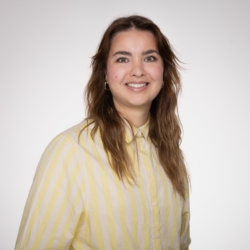
Mara Hinse, M.Sc.
Wissenschaftliche Mitarbeiterin
Mara Hinse, M.Sc.
Akademische Ausbildung und beruflicher Werdegang
- 2024: Wissenschaftliche Mitarbeiterin am Institut für Urban Public Health
- 2024: M.Sc. Raumplanung, Technische Universität Dortmund
- 2023: B.Sc. Raumplanung, Technische Universität Dortmund
Publikationen
Hornberg J, Schröder J, Schroeer K, Hinse M, Moebus S. Erhebung der urbanen Geräuschkulisse im Rahmen von Hörspaziergängen. In: Canzler W, Haus J, Kellermann R, Schröder S, Thomsen C, editors. Gemeinsam in Bewegung: Forschung und Praxis für die Mobilitätswende Beispiele und Erkenntnisse aus den Projekten der BMBF-Fördermaßnahmen MobilitätsWerkStadt 2025 und MobilitätsZukunftsLabor 2050: BeNaMo Sammelband. Nexus Institut für Kooperationsmanagement und interdisziplinäre Forschung und Wissenschaftszentrum Berlin für Sozialforschung.; 2024. p. 249-57. https://www.zukunft-nachhaltige-mobilitaet.de/sammelband/
Hornberg J, Hemker F, Schröer K, Hinse M, Moebus S, Schröder J. Association between perceived sound type dominance and overall assessment of the acoustic environment using ISO 12913 soundwalks. The Journal of the Acoustical Society of America. 2024;156(4):2827-37. https://doi.org/10.1121/10.0032472
Schröder J, Hornberg J, Schröer K, Hinse M, Moebus S. Ergebnisse aus Hörspaziergängen zur Erfassung der akustischen Qualität im Rahmen eines Reallabors zu Fuß- und Radmobilität im Ruhrgebiet. Gesundheitswesen. 2023;85(08/09):[268]. https://www.thieme-connect.com/products/ejournals/abstract/10.1055/s-0043-1770528
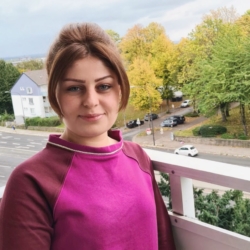
Dr. rer. medic.
Ellen Hillal
Assoziierte Forscherin
Dr. rer. medic.
Ellen Hillal
- 2020:
- 2019:
- Doktorandin der Medizinwissenschaften am Institut für Urban Public Health.
Arbeitstitel der Dissertation: „Nature-Based Solutions for Healthy and Sustainable Urban Regeneration“
- Doktorandin der Medizinwissenschaften am Institut für Urban Public Health.
- 2018:
- M.Sc. Sustainable Urban Technologies, Universität Duisburg-Essen
Masterarbeit: „Healthy Urban Development: The Case of Public Transportation System in Essen“
- M.Sc. Sustainable Urban Technologies, Universität Duisburg-Essen
- 2017:
- Das gesellschaftspolitische Begleitprogramm von „Leadership for Syria“, Universität Konstanz in Zusammenarbeit mit DAAD
- 2014:
- B.Sc. Bauingenieurwesen, Universität Damaskus, Syrien
Der 62. Deutsche Kongress für Geographie (DKG ’23), Frankfurt am Main, 2023.
Association between neighbourhood greenness and body mass index in a population-based study.
The Urban Health Transdisciplinary Forum (Urban Green), Bochum, 2023.
Association Between Neighbourhood Greenness and BMI: Results from the Heinz Nixdorf Recall Study.
Das Forschungskolloquium des Gerhard Mercator Graduiertenkolleg Weltoffenheit, Toleranz und Gemeinsinn, Online, 2022.
Nature-Based Solutions for Healthy and Sustainable Urban Regeneration.
ARUS-Kolloquium WS 2021/22 – Universität Duisburg Essen, 2021.
Nature-Based Solutions for Healthy and Sustainable Urban Regeneration.
„Study and Research for a Sustainable Future“, Online, 2021.
DAAD-Stipendiatentreffen.
ARUS-Kolloquium WS 2019/20 – Universität Duisburg Essen, 2019.
Nature-Based Solutions for Healthy and Sustainable Urban Regeneration.
Interdisziplinäres Doktorandenkolloquium – TU Dortmund, 2018.
Healthy Urban Development: The Case of Public Transportation System in Essen.
Schillen P, Danielzik K, Hillal E, Moebus S, Dehnen A. Primärärztliche Versorgungsungleichheiten zu Ungunsten der Bevölkerung sozial benachteiligter Stadtgebiete–eine Fallanalyse am Beispiel der Stadt Essen. Das Gesundheitswesen. 2023;85(12):1131-9. https://doi.org/10.1055/a-2175-8290
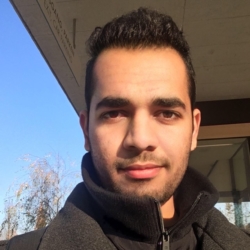
Salman Ahmed, M.Sc.
GIS Experte
Salman Ahmed, M.Sc.
- 2016:
- GIS Experte am Institut für Urban Public Health (ehemals Zentrum für urbane Epidemiologie), Deutschland
- 2015 – 2016:
- GIS Analyst am ILS – Institut für Landes und Stadtentwicklungsforschung, Deutschland
- 2016
- M.Sc. Sustainable Urban Technologies, Universität Duisburg-Essen, Deutschland
- 2012:
- B.E. Mechanical Engineering, Osmania Universität, Indien
Lawrence BT, Hornberg J, Schröer K, Djeudeu D, Haselhoff T, Ahmed S, Moebus S, Gruehn D. Linking ecoacoustic indices to psychoacoustic perception of the urban acoustic environment. Ecological Indicators. 2023;155:111023. https://doi.org/10.1016/j.ecolind.2023.111023
Schmiege D, Haselhoff T, Ahmed S, Anastasiou OE, Moebus S. Associations Between Built Environment Factors and SARS-CoV-2 Infections at the Neighbourhood Level in a Metropolitan Area in Germany. Journal of Urban Health. 2023.
https://doi.org/10.1007/s11524-022-00708-5
Haselhoff T, Lawrence B, Hornberg J, Ahmed S, Sutcliffe R, Gruehn D, Moebus S. The acoustic quality and health in urban environments (SALVE) project: Study design, rationale and methodology. Applied Acoustics. 2022;188:108538. https://doi.org/10.1016/j.apacoust.2021.108538
Lawrence BT, Hornberg J, Haselhoff T, Sutcliffe R, Ahmed S, Moebus S, Gruehn D. A widened array of metrics (WAM) approach to characterize the urban acoustic environment; a case comparison of urban mixed-use and forest. Applied Acoustics. 2022;185:108387. https://doi.org/10.1016/j.apacoust.2021.108387
Hornberg, J, Haselhoff, T, Lawrence, B, T, Fischer, J.L, Ahmed, S, Gruehn, D, Moebus, S. Impact of the COVID‐19 Lockdown Measures on Noise Levels in Urban Areas-A pre/during Comparison of Long‐Term Sound Pressure Measurements in the Ruhr Area, Germany. Int. J. Environ. Res. Public Health (2021), 18, 4653. https://doi.org/10.3390/ijerph18094653
Sutcliffe, R, Lawrence, B, T, Ahmed, S, Gruehn, D, Moebus, S. Acoustic quality and health in urban environments(SALVE) – a pilot study in the metropolitan Ruhr region, Germany, Cities & Health (2020). https://doi.org/10.1080/23748834.2019.1648362
Kartschmit, N, Sutciffe,R, Sheldon, M, P, Moebus, S, Greiser, K, H, Hartwig, S, Thürkow, D, Stenzel, U, van den Berg, N, Wolf, K, Maier, W, Peters, A, Ahmed, S, Köhnke, C, Mikolajczyk, R, Wienke, A, Kluttig, A, Rudge, G. Walkability and its association with prevalent and incident diabetes among adults in different regions of Germany: result of pooled data from five German cohorts. BMC Endocr Discord 20, 7 (2020). https://doi.org/10.1186/s12902-019-0485-x
Lawrence, B, T, Sutcliffe R, Ahmed, S, Dietwald, G, Moebus, S. A widened array of metrics (WAM) approach to characterizing urban soundscapes – the example in SALVE. Proceedings of the 23rd International Congress on Acoustics: integrating 4th EAA Euroregio 9-13 September (2019). https://doi.org/10.18154/RWTH-CONV-239644
Sutcliffe R, Lawrence, B, T, Ahmed, S, Haselhoff, T, Dietwald, G, Moebus, S. Acoustic quality and health in urban environments – First methodological experiences of the pilot study SALVE. Proceedings of the 23rd International Congress on Acoustics: integrating 4th EAA Euroregio 9-13 September (2019). https://doi.org/10.18154/RWTH-CONV-239761
Moebus, S, Sutcliffe, R, Lawrence, B, Ahmed, S, Haselhoff, T, Gruehn, D. Acoustic Quality and Health in Urban Environments – The SALVE Project. IS THIS THE REAL WORLD? Perfect Smart Cities vs. Real Emotional Cities. Proceedings of REAL CORP the 4th International Conference on Urban Development, Regional Planning and Information Society (2019), pp. 859-864. ISSN 2521-3938
Zepp, H, Inostroza, L, Sutcliffe, R, Ahmed, S, Moebus, S. Neighbourhood Environmental Contribution and Health. A novel indicator integrating urban form and urban green, Change and Adaptation in Socio-Ecological Systems (2018), vol. 4, no. 1, pp. 46-51. https://doi.org/10.1515/cass-2018-0005
Orban, E, Sutcliffe, R, Ahmed, S, Moebus, S. Potenziale der räumlichen Epidemiologie in der Metropole Ruhr Public Health Forum (2016), vol. 24, no. 4, 2016, pp. 281-284. https://doi.org/10.1515/pubhef-2016-2134
Studentische Hilfskräfte
Keine Mitarbeiter in dieser Kategorie, Kategorienkombination oder AuswahlEhemalige
- Oxana Klassen
- Kai Schröer
- Jonas Hornberg
- Uta Hildebrand
- Lilia Werner
- Julita Skodra
- Dany Amand Djeudeu Deudjui
- Robynne Sutcliffe